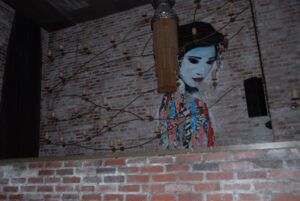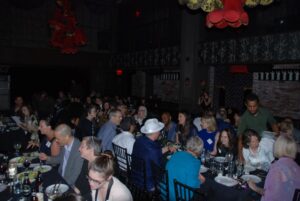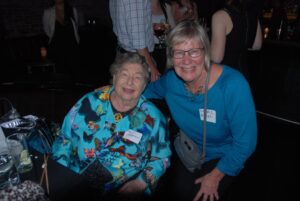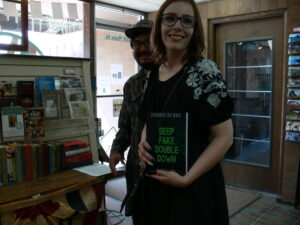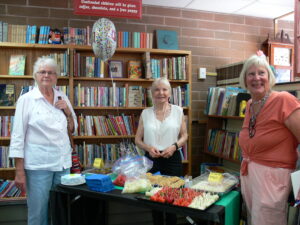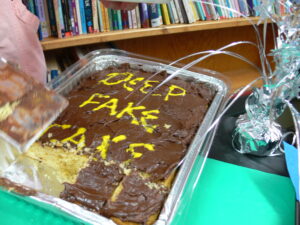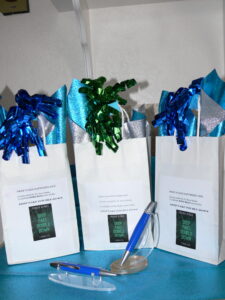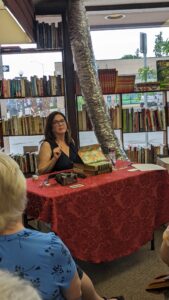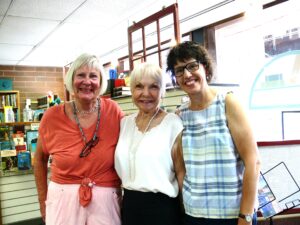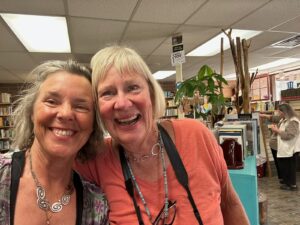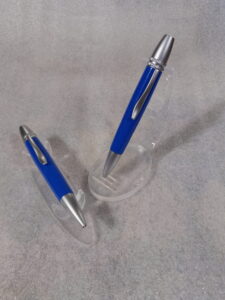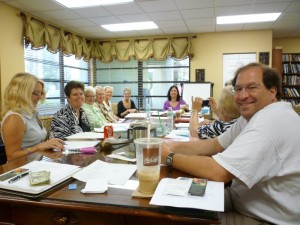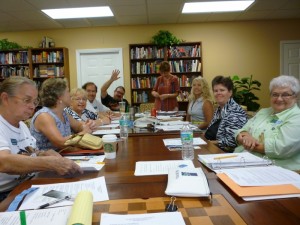Conference and conventions can be an important part of a writer’s development, helping with craft, connecting with both readers and other authors, and recharging your creative batteries.
Last week my wife and I attended the 83rd World Science Fiction convention, held in Seattle this year. World Cons run for five days, and are packed with programming, including a writing and publishing track. Around 7700 people attended. I moderated a panel on crafting a sustainable writing career, and was also on the “Writers Workshops: The Good, the Bad, and the Ugly,” panel, and sat in the audience for a number of other panels, including an excellent one on the state of the science fiction magazine market in 2025 and another on British mysteries and what makes them different from American ones.
While I’ve been to numerous science fiction conventions and several writers conferences, my one mystery conference so far was Left Coast Crime 2024, also held in the Seattle area, which I found to be equally engaging. I had the privilege of moderating a panel and being on another one, and also met a number of fellow authors and also avid readers.
Today we revisit three posts by Michelle Gagnon, Laura Benedict and Terry Odell that provide advice on attending conferences. All three are worth reading in full and, as always, are linked from their respective dates.

- What do I hope to get out of it? Mind you, I love hanging out with fellow writers and fans, but it’s hard to justify spending a thousand dollars over a weekend to do that (especially in this economy). So ideally, I hope to get on at least one good panel, and to network with people I haven’t met yet. There’s always a lot of debate on the lists about which conferences are worth attending, and I’m certain that everyone has a different experience. You might sell more books at smaller regional ones where you’re one of a handful of authors, whereas at larger conferences you might get lost in the shuffle. Yet at those big conferences there’s an opportunity to meet domestic and foreign editors, booksellers, and agents, and to get your name out to a larger cross-section of mystery fans.And sometimes the regional conferences are skewed toward local authors, so if you’re not from the area, you might find yourself relegated to the panel on bug detectives (not a well-attended one, in my experience). So it largely depends on what your career goals are at that given moment. Personally, I’m doing the same thing with conference attendance that I do with my financial portfolio: spreading it out between smaller conferences like Left Coast Crime (they had me at “Hawaii”) and big ones like Bouchercon (which I always seem to get a lot out of).
- Is it a fan conference, or a writing one? Not that writers aren’t fans- we all are, obviously. But some conferences specialize in helping new authors hone their craft and pitch agents- which is invaluable for them, but I’ve discovered that at those conferences, I spend most of my time dodging requests to pass a manuscript on to my agent. I’d much rather go to a true fan conference, where most of the attendees are readers who want to meet their favorite bestselling authors, and who might be persuaded to try a new one as well.
- Which genre does the conference emphasize? I’ve gone to a few romance conferences, and so far haven’t had much luck with those (although I know my friend Alex Sokoloff has had a much more positive experience). For me, going to RWA felt like starting over again; I didn’t know the lingo, and since romance isn’t a major component of my books, I drew a lot of blank stares. I’m considering giving Romantic Times a shot when it lands a bit closer to home, but flying to Orlando isn’t a possibility for me this April.
Michelle Gagnon—February 5, 2009
Here are some things to keep in mind if you decide to pop out of your writing cocoon and go to a conference or other gathering of industry folk:
Be confident.
This sounds difficult, I know. Sometimes you just have to fake it until you feel it. The NYT bestselling writer waiting in the coffee line ahead of you sits in front of the same blank page that you do every day, thinking, “What comes next?” You have that in common. You’re there for a reason, so act like it.
Be professional.
This is part of your job. Be sure you note the name of the person you’re talking to. It’s okay to ask, and asking is far preferable to ending up halfway through an impromptu lunch, petrified that you’ll be called on to perform introductions if someone else shows up. If small talk is required, talk about a panel or interview you just attended, or a book you recently read. Not your gallbladder, kids, or most recent tooth implant.
Be ready to learn.
Immerse yourself in the conference agenda. People who are interested in the same things you’re interested in put the panels and events together. It’s not all about networking.
Be curious.
Most people love to talk about themselves. Ask questions about their work, their pets, their hometown, their (professional) passions. Most wildly successful authors are good at making other people feel special in a short space of time. Really.
Be modest.
We’ve all gotten the FB messages: “Hey, we’re friends now. Buy my book!” Every writer wants other people to know about their work. But don’t make that your main goal. Your goal is to learn things, make new friends, and reconnect with old friends. There’s always a good time to exchange cards or bookmarks or websites. Name-dropping is a bit gauche, but allowed in small doses if it’s relevant to the discussion—or makes a better story.
Be gracious.
Be as nice to the mid-list or self-published writer standing beside you as you are to the editor you would kill to have publish you. Chances are you’ll have far more contact with that writer in your career than you will the editor. Not everything is about getting ahead. It’s about being a decent human being. Few things are uglier than people who spend their professional lives sucking up and kicking down.
Be generous.
You didn’t get to where you are as a writer all by yourself. I guarantee that someone around you has less experience. Introduce yourself to someone who looks as uncomfortable as you feel. Make them feel special. It won’t cost you anything, and the benefits are precious.
Laura Benedict—September 21, 2016
Left Coast Crime is a reader-based conference, which means the focus is on connecting writers with readers. The panels will be aimed more at “tell us about your book” and they’re a great way to meet readers and let them know what you have to offer. In a writer’s conference, a workshop on setting would tell you how important it is, and would give you a “lesson” in how to develop setting in your book. At a reader’s conference, the panel will be a discussion of where each author sets his or her books, and why they chose that setting. Same goes for characters, or genre, or anything else.
This year, I’m on a “Romance in Mystery” panel and who knows where that one will go! Ultimately, the goal is to entice readers to pick up the books, and also to let them know you’re a real, live, person. It takes a different mind-set when you attend a conference like this as an author. You’re wearing a marketing hat, not a writing hat.
However, no matter what kind of a conference you attend, there are some “survival” techniques I’ve picked up over the years, listed in no order of importance.
- Have copies of your receipts. Nothing like finding out they’ve lost your registration or meal choices or room reservation to start things off on a stressful note. Better to have them and not need them than to need them and not have them.
- Bring your own tote if you have one.Although most conferences hand out tote bags, they all look alike. If you bring one from a different conference, you’re less likely to have it picked up by mistake. (I also bring my own badge holder—the kind with compartments from another conference, just in case they give you a simple plastic one. This way, I’ve got a secure place for my badge, meal tickets, a little cash and other vitals—like business cards or bookmarks.)
- Don’t be afraid to meet people.It’s not required that you travel with a glued-to-the-hip companion. Take an empty seat, smile, hand over your business card, bookmark, or simple swag, and introduce yourself. This is one place where there’s an immediate conversation starter: “What do you write?” Or, in the case of a readers’ conference ‘read’? On the flip side, be polite and invite people to join you, include them in conversations. There’s a popular author who ignored me at a conference lunch table, and I haven’t bought any more of his books. Another good way to “mingle” is to volunteer. Most conferences are always looking for help.
- Bring comfortable clothes, especially shoes.You’ll be doing a lot of sitting, and a lot of walking, depending on how far apart the meeting rooms are. Also, bring layers. Regardless of the outside temperatures, meeting rooms can be meat-locker cold or steamy hot.
- Pace yourself.You’re not obligated to participate in every single event. Take breaks. Hide in your room for an hour if you need to. I long ago stopped feeling guilty about crawling into bed with a book at a decent hour. A lot of action takes place in the bar, so think about leaving some time for a visit there. Prioritize. Returning home with “conference crud”, or these days, the nasty virus, isn’t the souvenir you want.
Terry Odell—March 15, 2023
***
- Do you attend writing / genre conferences? Do you have a favorite?
- If you attend a conference, what do you hope to get out of it?
- Any advice on getting the most out of your conference?

